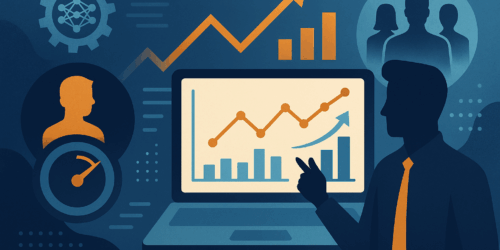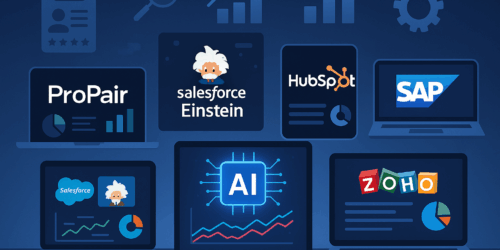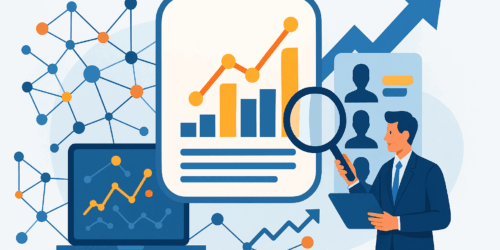What's in this article?
Predictive AI is rapidly transforming the way businesses approach their sales strategies. By leveraging advanced algorithms and data analytics, organizations can not only predict future sales trends but also enhance their lead management processes significantly. This article explores how predictive AI plays a crucial role in boosting sales performance and provides insights into its integration into modern sales strategies.
Understanding Predictive Sales Analytics
Predictive sales analytics involves the use of AI to process vast amounts of data, identifying patterns and making predictions about future sales outcomes. This technology is invaluable in today’s marketplace as it enables sales teams to prioritize high-value leads and allocate resources more effectively. Predictive AI tools analyze historical data and current market trends to forecast sales performance, offering a data-driven edge over traditional intuition-based methods.
As organizations collect more data from varied sources, predictive analytics allows sales managers to refine their strategies continually. It translates raw data into actionable insights, ensuring that every lead receives optimal attention and follow-up.
How AI Enhances Lead Assignment and Conversion
AI-driven systems have revolutionized lead assignment by removing human bias and ensuring that leads are distributed based on data-driven criteria. These systems evaluate leads against historical data and current market signals, assigning them to sales representatives best equipped to convert them.
According to recent studies, AI improves lead conversion rates significantly by reducing the time taken to respond to incoming leads and by enabling a more personalized approach through data insights. The automated nature of AI in lead management also allows sales teams to focus on strategic interactions rather than administrative tasks.
Key Benefits of Predictive AI in Sales
One of the primary benefits of predictive AI is its impact on sales forecasting accuracy. By analyzing complex datasets, AI can predict sales patterns with a precision that manual methods can’t match. This accuracy aids in budget allocation, inventory management, and workforce planning.
Additionally, predictive AI contributes to effective resource allocation. Sales managers can distribute their resources optimally, focusing on leads with the highest likelihood of conversion. This strategic allocation ensures a higher return on investment and boosts overall sales productivity.
Implementing Predictive AI in Your Sales Strategy
Integrating predictive AI into your sales strategy involves several steps. First, it’s essential to have a clear understanding of your current sales processes and data streams. Once these are mapped out, the next step is selecting a predictive AI solution that aligns with your business objectives. ProPair offers specialized tools designed to enhance lead management and sales forecasting, leveraging robust AI algorithms for measurable results.
Best practices include starting with a pilot program to test predictive AI’s impact before a full-scale implementation and continuously refining data inputs to enhance model accuracy.
Challenges and Solutions in Predictive Sales Analytics
While the advantages are clear, implementing predictive AI does come with challenges. Common hurdles include data silos, resistance to change within sales teams, and the need for ongoing model training. Solutions to these challenges include investing in education and training for your sales team to ensure buy-in, and employing tools that integrate seamlessly with existing CRM systems to break down data silos.
It’s also crucial to partner with AI providers like ProPair that offer ongoing support and updates as models evolve, ensuring continual alignment with business needs.
Real-World Case Studies
Companies across industries have successfully leveraged predictive AI to boost their sales performance. For instance, a leading insurance firm saw a 30% increase in lead conversion rates after implementing ProPair’s AI-driven lead distribution system. The system enabled sales reps to engage more effectively with leads, reducing the time to conversion and ultimately enhancing customer satisfaction.
By embracing predictive AI, businesses can stay ahead in an increasingly competitive marketplace, maximizing the efficiency of their sales processes and achieving sustainable growth.
FAQ
What is predictive sales analytics?
Predictive sales analytics uses AI to analyze data and predict future sales trends, enhancing lead management and forecasting accuracy.
How does AI improve lead assignment?
AI improves lead assignment by analyzing data-driven criteria to match leads with the most suitable sales representatives, boosting conversion rates.
What are the key benefits of predictive AI in sales?
Key benefits include improved forecasting accuracy, effective resource allocation, and enhanced conversion rates due to data-driven strategies.
Moving Forward with Predictive AI
To transform your sales strategy with predictive AI, consider engaging with ProPair to explore tailored solutions that fit your business needs. By adopting AI-driven tools, your organization can unlock new levels of efficiency and effectiveness, turning data into actionable insights that drive growth.
Learn More: Schedule a Demo with ProPair
Related Reading:
AI Strategies for Sales Directors
Predictive Lead Scoring Overview
Improving Sales Performance Through AI



